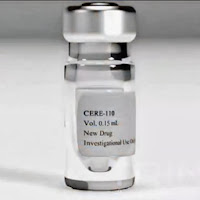
Huntington’s Dementia Problem Fixed in Mice
Researchers discovered how genetic mutations in Huntington’s disease kill brain cells. Learn why this discovery may be relevant to other types of dementia, as well.

Researchers discovered how genetic mutations in Huntington’s disease kill brain cells. Learn why this discovery may be relevant to other types of dementia, as well.

The 2014 update to the National Plan to Address Alzheimer’s Disease was unveiled at the Advisory Council on Alzheimer’s Research, Care, and Services in Washington, DC. Check

VIDEO + ARTICLE CERE-110 is a big step forward for Alzheimer’s clinical trials. It induces brain cells to make their own nerve-growth-factor, so they can

VIDEO + TRANSCRIPT: 3 experimental drugs are part of a fascinating genetic study on how to prevent Alzheimer’s. NBC’s chief science correspondent Robert Bazell investigates.

International researchers pinpointed a rare coding variation in the Phospholipase D3 (PLD3) gene which is more common in people with late-onset Alzheimer’s than non-sufferers. Find

VIDEO & IN-DEPTH ARTICLE The world’s 4 largest international Alzheimer’s genetic consortiums have joined forces. The goal? To win the war on Alzheimer’s. Since joining

A new pineapple turmeric apple cider vinegar blend from Bragg is turning heads—not just for its flavor, but for its potential brain-boosting benefits. Could this tangy tonic play a role in Alzheimer’s prevention?

All a caregiver for Lewy Body Dementia needs to know, from symptoms to diagnosis to care for their loved one and themselves, for the entire caregiving journey. Part memoir and part help book.

Does pain relief risk cognitive cost? A major new study of almost 200,000 people says yes—and the price may be higher than we thought.

SHORT-TERM MEMORY lapses are obvious signs of Alzheimer’s, but other tell-tale signals begin to show much earlier. Learn how to look for semantic impairments, such as simple questions about size.

Three important dementia studies focus on HS-AGING, a type of dementia almost as common as Alzheimer’s in the 85+ group. Yet few people have heard of it. Why? What makes it different?

An intriguing study of 120 grandmothers might surprise you. Doctors know socially engaged people have better cognition and less dementia. But can a person get too much of a good thing? What’s the right balance?

Enjoy this great duet between a musician with dementia and his son. A triumph of spirit over Alzheimer’s! Sing-a-long if you like!
No spam, only news and updates.


